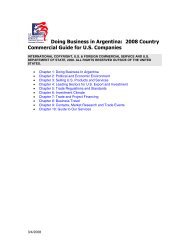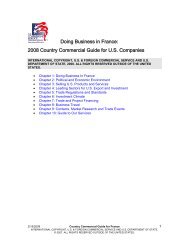Doing Business In Saudi Arabia - Bna
Doing Business In Saudi Arabia - Bna
Doing Business In Saudi Arabia - Bna
You also want an ePaper? Increase the reach of your titles
YUMPU automatically turns print PDFs into web optimized ePapers that Google loves.
The U.S. Embassy, working closely with <strong>Saudi</strong> security officials, periodically advises<br />
American citizens of potential security concerns.<br />
Corruption Return to top<br />
<strong>Saudi</strong> <strong>Arabia</strong> has some, albeit limited, laws aimed at curbing corruption. The Tenders<br />
Law of <strong>Saudi</strong> <strong>Arabia</strong>, approved in 2004, has improved transparency within government<br />
procurement through publication of such tenders. Further, ministers and other senior<br />
government officials appointed by royal decree are forbidden from engaging in<br />
business activities with their ministry or government organization while employed<br />
there. There are few cases of prominent citizens or government officials being tried on<br />
corruption charges. The National Authority to Combat Corruption and the General<br />
Auditing Bureau are charged with combating corruption.<br />
Foreign firms have identified corruption as an obstacle to investment in <strong>Saudi</strong> <strong>Arabia</strong>.<br />
Government procurement is an area often cited, as is de facto protection of<br />
businesses in which senior officials or elite individuals have a stake. Bribes, often<br />
disguised as “commissions," are reputed to be commonplace.<br />
<strong>Saudi</strong> <strong>Arabia</strong> has signed but not ratified the UN Anticorruption Convention. <strong>Saudi</strong><br />
<strong>Arabia</strong> is not a signatory of the OECD Convention on Combating Bribery.<br />
Bilateral <strong>In</strong>vestment Agreements Return to top<br />
There is no bilateral investment treaty in force between the United States and <strong>Saudi</strong><br />
<strong>Arabia</strong>, although both sides have exchanged draft texts for review. GCC countries and<br />
their nationals receive favorable investment treatment derived from GCC agreements.<br />
OPIC and Other <strong>In</strong>vestment <strong>In</strong>surance Programs Return to top<br />
The Overseas Private <strong>In</strong>vestment Corporation (OPIC) no longer provides coverage in<br />
<strong>Saudi</strong> <strong>Arabia</strong>. <strong>In</strong> 1995, OPIC removed <strong>Saudi</strong> <strong>Arabia</strong> from its list of countries approved<br />
for OPIC coverage because of <strong>Saudi</strong> <strong>Arabia</strong>'s failure to take steps to comply with<br />
internationally recognized labor standards. Details on OPIC programs and coverage<br />
can be obtained at. www.opic.gov. <strong>Saudi</strong> <strong>Arabia</strong> is a member of the Multilateral<br />
<strong>In</strong>vestment Guarantee Agency.<br />
Labor Return to top<br />
The Ministry of Labor and the Ministry of <strong>In</strong>terior regulate recruitment of expatriate<br />
labor. <strong>In</strong> general, the government encourages recruitment of Muslim workers, either<br />
from Muslim countries or from countries with sizable Muslim populations. The largest<br />
groups of foreign workers now come from Bangladesh, Egypt, <strong>In</strong>dia, Pakistan, the<br />
Philippines, and Yemen. Westerners compose less than two percent of the labor<br />
force, and the percentage is dropping as <strong>Saudi</strong>s and less-expensive expatriates from<br />
developing countries replace them.<br />
5/13/2008












